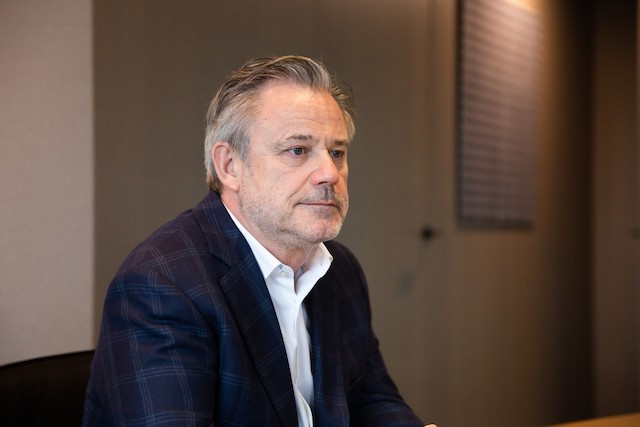With a plate full of fresh fruit on one side and his tablet on the other, Marc Giorgetti goes through his photos until he finds shots worthy of a science-fiction film: they show paramedics wearing full protective suits picking him up from his home to hospital at the beginning of March 2020.
“I had no fever or symptoms. Then I started having a little bit of a headache and I was a little tired. That's all,” explains the managing director of the construction company Félix Giorgetti.
His long weekend with friends was cut short: as the gang approached his holiday resort in Switzerland, Giorgetti learned that he had been in contact with a covid-19 carrier. As a precaution, the entrepreneur decided not to go to a restaurant and offered to get takeaway pizzas for his friends before returning to Luxembourg the next day. The six people hit the road again in the same van and were tested: only the boss of the construction company was positive.
“Unfortunately, nobody knew what to do. It was new for everyone,” Giorgetti recalls. He was hospitalised in the CHL in total isolation: only medical personnel could approach him, by passing through an airlock and wearing a protective suit. Every two to three hours, his temperature was taken.
After four days, he was able to go home: “It was far less serious than what they say on television,” says the man who continued to manage his company from his hospital bed and then from his home, where he was placed in isolation.
He regularly reported on his state of health in an internal memo addressed to his 1,600 employees in Luxembourg. The objective was to reassure and keep the group running smoothly. Because at the beginning of March 2020, the weather was mild and there were many deadlines. However, when on 17 March, Prime Minister Xavier Bettel (DP) decreed a state of crisis and announced the closure of the construction sites by 20 March, it struck a major blow for the firm.
Global economy
“In the construction industry, 55,000 people in Luxembourg didn't work for a month,” says Giorgetti, before drawing one of his many notebooks. He summed up the hourly wage, the number of working hours concerned, the VAT not charged, the profit margin and the taxes that resulted for the whole economy: “It cost the economy almost €100 million per week”, he concludes.
The cost of the pandemic to his company? He says he'd rather not know, but one thing is certain: “We're looking at at least a 10% loss of revenue.” The company has invested in the renovation and reorganisation of the changing rooms to ensure compliance with social distancing standards, introduced different time slots for meal breaks, installed hand washing points, but also one-way staircases to avoid crossing paths, thus limiting the risk of contamination. “My catching covid ahead of everyone else has allowed me to manage the situation here,” says the entrepreneur.
But his strongest gesture undoubtedly goes back to the resumption of the collective leave at the end of August 2020, when the Félix Giorgetti firm set up a covid screening centre for its workers. “I invested €100,000 in this project, which was carried out in collaboration with Laboratoires Réunis”, says the manager. “People don't realise the scale that covid is taking economically, but I did my calculations: one contaminated person involves 10 people who are at home for 15 days, it's impossible for me to replace them like that.”
Fears
Almost a year after his illness, the Luxembourger remembers the “disproportionate” measures put in place in relation to the situation: “The commonly accepted interpretation is that people die as a result of covid. We no longer speak of other causes of death.” If he applauds the management of the health crisis, he regrets the slowness of the vaccination and deplores the neglect of the economic and psychological aspects. The closure of the food and drinks (horesca) sector and its 12,000 employees? “The home remains the first place of contamination, not restaurants”, Marc Giorgetti stresses. The massive recourse to telework? “There is the risk of doing more TV than work,” he answers with a sly smile, not to mention the temporary but long-lasting reduction of tax limitations for cross-border commuters: “Imagine if one day these 200,000 cross-border commuters were taxed in their country of residence, it could cut social income by half in Luxembourg.”
This article was originally published in French on Paperjam.lu. It has been translated and edited for Delano.
